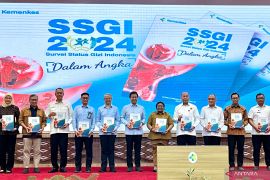"A child will achieve 85 percent of brain development at the age of two years," the ministry's director of maternal-child nutrition and health, Lovely Daisy, said in a podcast on Friday.
Therefore, children's growth disorders must be prevented by optimal nutritional intake from the mother's marriage phase and pregnancy, as well as intake of breast milk and additional food before they reach two years of age, she said.
The ministry has carried out an intervention for prospective brides in the form of providing blood-added tablets to young women.
"One in three young women experience anemia. If they are pregnant, they will suffer more severe anemia because blood volume increases during pregnancy," she noted.
Meanwhile, for the pregnancy phase, the intervention involves strengthening the role of integrated health posts (posyandu) and community health centers (puskesmas) in early stunting detection through consultation, examination, and periodic immunization, she said.
Daisy said that fetal growth and development can also be monitored using an ultrasound device to check if it matches the fetal growth and development curve based on the World Health Organization (WHO) guidelines in the Maternal and Child Health (KIA) book issued by the Health Ministry.
"We will match the baby's height based on the age with the curve determined by the WHO. If the height is below the red line, then it is a stunting case," she explained.
After delivery, mothers can provide exclusive breast milk to babies till they turn 5 months old and continue to provide complementary breast milk and food containing animal proteins to the child from 6–24 months, she said.
According to her, the crucial age range for stunting intervention is 6–24 months when breastfeeding is no longer sufficient for meeting all nutritional needs. Therefore, it needs to be accompanied by providing additional food containing animal proteins.
"That is why stunting cases start to increase at the age of six months. The intake of breast milk is not enough to fulfill the nutritional needs, or maybe the baby is often sick and it hinders the development," she addressed.
Daisy said that vegetable proteins and carbohydrates must be complemented with animal proteins in the form of eggs, fish, chicken, or beef. She further said she hopes that all these interventions can help reduce national stunting prevalence to a maximum of 17.8 percent by 2024.
In 2022, stunting prevalence in the toddler population in Indonesia was recorded at 21.6 percent, down from 24.4 percent the previous year.
"This year, we are still waiting for the survey regarding stunting prevalence in Indonesia. The result will be published next month. Our target for stunting prevalence is at least 17.8 percent for this year and 14 percent for next year," she said.
Related news: Govt targets regions with high stunting for plumbing installation
Related news: Stunting prevention efforts should start from pregnancy: minister
Translator: Andi Firdaus, Resinta Sulistiyandari
Editor: Tia Mutiasari
Copyright © ANTARA 2023












